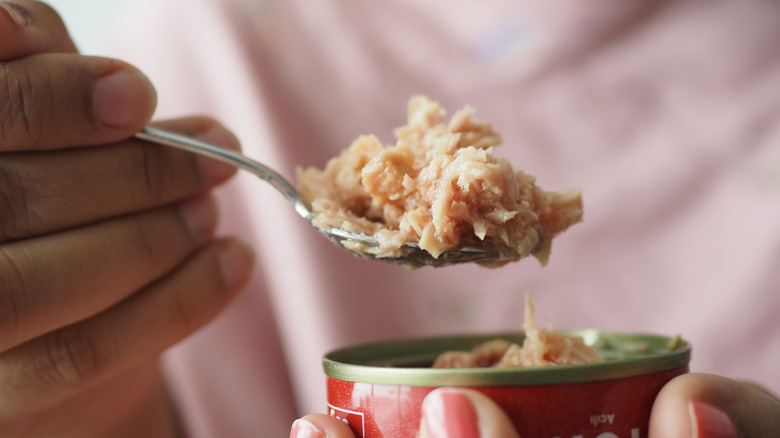Before Buying Canned Tuna, Always Check The Label For This
Canned tuna is one of those things you should always have in your pantry. It's a lifesaver when you're in a rush and only have a few minutes to make a quick tuna salad or sandwich. Sadly, like other fish, tuna has been the victim of poor industrial practices that have led to high levels of mercury in the water. Don't worry: This doesn't mean you should stop eating tuna altogether. Light canned tuna is one of the fish with the lowest levels of mercury. You may not want to eat it everyday, but it's fine to eat it regularly. That said, you will want to pay attention to the kind of tuna you're buying, since mercury levels can vary dramatically based on the species.
According to the FDA, the mean mercury concentration of light canned tuna is only 0.126 particles per million (PPM). Fresh or frozen skipjack has slightly higher levels, with 0.144 PPM. The numbers get scarier with other species. Fresh or frozen yellowfin has 0.354 PPM, while fresh and frozen albacore have 0.35 and 0.358 PPM respectively. Non-canned bigeye has the worst levels of all tuna species, with a shockingly high 0.689 PMM. This worrisome difference may be attributable to size since light and skipjack tunas are typically smaller. In the life of a fish, a lengthy life and bigger size might lead to accumulating more mercury. When shopping for canned tuna, skip the bigger species and go for light or skipjack instead.
Other things to check when buying tuna
Besides mercury levels, there are other aspects consumers should consider when buying any type of fish. One of them is the catching practices that companies use, since some practices contribute to overfishing or excessive bycatch (other marine life that gets caught in nets). Avoid this mistake while buying tuna by seeing if the can says the fish were caught via pole, pole and line, or trawl, which are the best methods in terms of environmental responsibility. You can also look for labels like "school-caught" or "free school" to check that the company is taking measures to reduce bycatch. Companies usually like to boast when they do things well, so if you don't see them bragging, they probably aren't engaging in responsible practices.
Despite the mercury issue, tuna has plenty of vitamins and protein, so consuming it in moderation is healthy. If you still feel iffy about it, you can go for canned fish alternatives that have even lower levels of mercury. Sardines take the top spot for this, with just 0.013 PPM. Anchovies don't do too badly themselves, boasting 0.016 PPM. Canned salmon's 0.014 PPM also gives it a top spot, but unlike other fish, it doesn't taste too good in this form. All in all, just know you don't need to be worried about eating tuna (or other fish), but you should still play it safe by getting the kinds of tuna that rank better in terms of mercury levels just to be safe.

